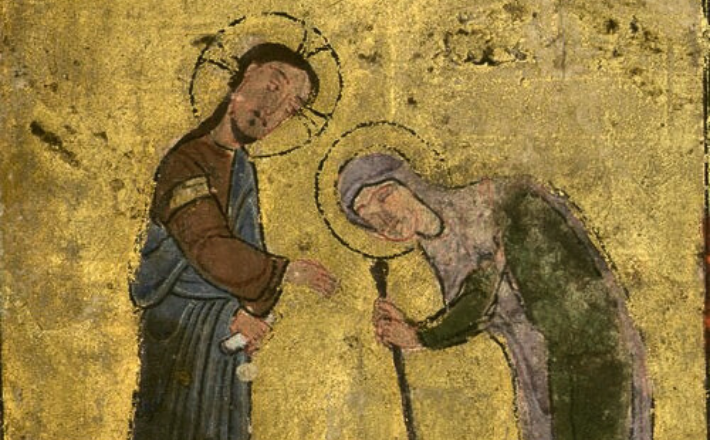Commentary on Isaiah 58:9b-14
In Isaiah 58, we have two problems. The people do not know how to love God well, and they have no idea why God does not seem to respond to their prayers. Because of faulty worship, there is a massive disconnect between what the people have been doing for God and what God wants. The prophet gives insight into motivations and desires from both sides and points to how reconciliation is possible.
The worshipers of God, probably intended as returned exiles from Babylon, are practicing worship meant to evoke God to action. The people fast to convince God to answer their prayers. They ask, “Why do we fast, but you do not see? Why humble ourselves, but you do not notice?” (58:3). The problem is not that God has not perceived their actions. Instead, God notices that the people have a theology problem.
The God of Abraham, Isaac, and Jacob does not need to be coaxed into action by human performance. Many generations earlier, Elijah mocked the Israelite devotees of Baal for afflicting themselves to try to provoke their god to action (1 Kings 18:20–40). Unlike the cognate gods in surrounding cultures, the God of Israel does not need to be persuaded to pay attention to humans. Instead, the problem is exactly the opposite. The God of the Bible does not miss a detail.
Where the people had been fasting and crying out to God, wondering why they were being ignored, the prophet tells them that God has actually been paying very close attention. Certainly, the people had been fasting. But they had also been committing injustice—abusing workers, looking only to their own interests on sacred days, and committing wanton violence (58:3–4). Not eating, covering oneself in ashes, and prostrating oneself while actively committing evil will never gain God’s sympathetic help. Instead, God desires active work on behalf of the poor and victims of injustice.
Don’t refrain from eating; instead, share a meal with the poor (verse 7). Don’t wear sackcloth; instead, share your clothes with the naked (verse 7). Refrain from building up your own household, and instead, do the work to tear down unjust systems that keep people bound in oppression (verse 6). If people worship God in pleasing ways, of course God will respond to them with alacrity (verses 8–9a). The reading for this week offers five “if” statements, followed by several promises. The obedience and actions God wants are not about provoking God’s attention but are focused on responding to God’s commandments.
The first two “if” statements focus on communal righteousness. In verse 6, the hearers are instructed to undo and break yokes that turn human bearers of the divine image into chattel beasts of burden. And in the second half of verse 9, the expectation is that the technology that enables dehumanizing, compelled work will not even be found among God’s people. If the yoke to be removed means the destruction of dehumanizing work, pointing the finger and speaking the evil word must be interpreted similarly. Humans are not allowed to say, “Your oppression is a price I am willing to pay for my comfort.”
In previous generations, Americans could look at chattel slavery in service to the southern cotton and tobacco industries and immediately hear Isaiah 58 speaking to their moral issue. Will we tolerate the yoke on others, or not? Without enslaved humans, the political economy of the Confederate states would collapse! Good! Are we willing to turn the same vision of moral clarity on ourselves today in considering how much of our technology is built from conflict minerals? Are we willing to examine how the AI that increasingly becomes part of our daily lives is an environmental and energy disaster that is accelerating global climate change and making survival for humans on the margins even more difficult?1
God’s promises for a community that rids itself of systematic oppression—and the evil words and finger-pointing that enable it—are striking. Gloom will become bright. God will meet needs in the difficult times—and there will always be difficult times after upsetting the abusive systems, let’s not kid ourselves. But here’s the thing: Ruined structures of community will be rebuilt. And areas that have been impoverished and deserted will, instead, be home to burgeoning communities that will house generations. Neighbors will know and care for each other on populated streets. This is God’s vision for thriving community that is a built-in reward for not tolerating injustice.
One of the greatest temptations to embrace injustice and idolatry is to succumb to the constant felt need to do and be productive. I teach and research in a university entrepreneurship department, and I see the direct, inescapable pipeline from “hustle culture” to burnout every day. God insists, in the last three “if” statements, that Sabbath can be a joy, if we are wise enough to obey God and embrace it. All too often, humans want to do more and reject God’s wisdom in insisting on rest. We trample the Sabbath to our own detriment, and to the detriment of those who are forced to work to cater to us.
Research by one of my colleagues shows how a “relational identity with God” (RIG) in which the person defines herself as a “child of God,” a “member of the Body of Christ,” or “a simultaneous saint and sinner” leads to a decrease in burnout, greater feelings of peace in anxious times, and a greater willingness to rest and honor Sabbath commandments to cease work.2 Obeying commandments to honor the Sabbath not only leads people to delight in the Lord (58:14) but also to be able to delight in the rest of their days, rested, rejuvenated, and free from guilt at being complicit in the oppression of others.
Isaiah 58 offers two starkly contrasted visions of worship. One is prayer and fasting that are unheeded by God because they do nothing to undermine the production of injustice. The worship that God would prefer is characterized by actively interdicting injustice and oppression, and in obeying commandments that God gives us for our own good. If we are wise, we will live in such a way that is good for ourselves, others and the planet.
Notes
- “One query to ChatGPT uses approximately as much electricity as could light one light bulb for about 20 minutes. … So, you can imagine with millions [billions!] of people using something like that every day, that adds up to a really large amount of electricity.” Dara Kerr, “AI Brings Soaring Emissions for Google and Microsoft, a Major Contributor to Climate Change,” NPR, July 12, 2024, https://tinyurl.com/4x29xphk.
- “From Research to Practice: Navigating the Highs and Lows of Entrepreneurship,” Life, accessed June 28, 2025, https://tinyurl.com/2er88b9j.


August 24, 2025